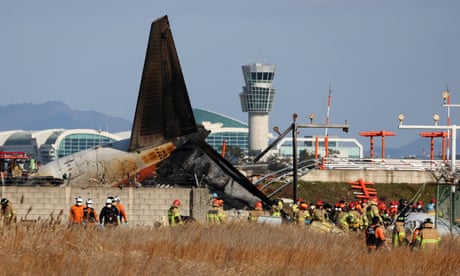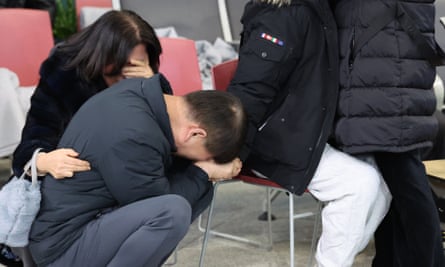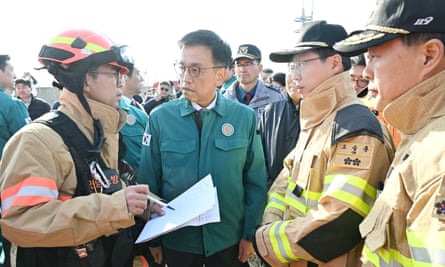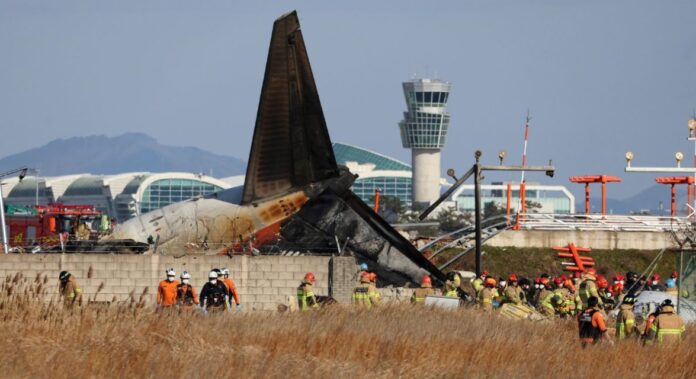Officials said all 175 passengers and four of the six crew members were killed when the Boeing 737-800 attempted an emergency landing, smashed into a wall and burst into flames at 9am local time at the airport, about 185 miles south-west of Seoul.
Two flight attendants who survived are being treated in hospital. One was in an intensive care unit with fractures to his ribs, shoulder blade and upper spine, said Ju Woong, the director of the Ewha Womans University Seoul hospital. The man told doctors he woke up to find himself rescued.
Flight data and cockpit voice recorders recovered from wreckage of Jeju Air flight 2216 at Muan airport
A stench of kerosene hung over the airport on Sunday night and scattered plane seats, suitcases and twisted bits of metal were visible close to the wrecked fuselage of Jeju Air flight 2216, which had been carrying mainly Korean passengers returning from winter holidays, as well as two Thai passengers.
Joe Biden said in a statement that he and First Lady Jill Biden were “deeply saddened to learn of the loss of life” and noted that “as close allies” of South Korea whose people “share deep bonds of friendship” with Americans, “our thoughts and prayers are with those impacted”.
A team of US team air accident investigators led by the NTSB, FAA and Boeing, makers of the 737-800 that crashed, would be assisting Korean air investigators, the NTSB said Sunday, as air safety experts questioned why the plane had not been able to lower its undercarriage after one engine was hit by what appeared to be a bird strike.

Footage of the crash showed the aircraft skidding along the runway and veering off across a buffer zone before striking a concrete barrier at high speed and bursting into flames as parts of the fuselage flew into the air.
A local fire official said the crash could have been caused by a bird strike and weather conditions, but the exact cause was not yet known.
By late Sunday afternoon, floodlights illuminated the twisted wreckage as a huge yellow crane lifted the fuselage and officials continued the search and rescue mission.
AFP reported that behind police cordon tape stretched across the wire fence at the edge of the runway there were plane seats and other chunks of metal, offering a glimpse of the catastrophic impact of the crash.
Inside the airport terminal, more than 100 family members gathered to receive updates about their loved ones, many looking stunned and tearful. When a fire chief told families that most passengers were presumed dead, the room erupted in wails of grief.
“Is there absolutely no chance of survival?” one family member asked. The fire chief could only bow his head and reply: “I’m so sorry, but that’s what it’s looking like.”
One woman was carried away on a stretcher, apparently having passed out from shock.
Later in the day, boards typically used for arrival and departure information were instead displaying the names, dates of birth and nationalities of the victims.
“I had a son onboard that plane … he has yet to be identified,” one elderly man waiting in the airport lounge told AFP. The sounds of people wailing and screaming echoed through the two-story airport building as the names and identities of victims were confirmed.
“My younger sister went to heaven today,” a 65-year-old woman who gave only her surname, Jo, told AFP. Her sister had been on holiday with friends in Bangkok, the woman said. “My husband is now trying to check whether she’s been identified.”

Authorities said the youngest passenger was a three-year-old boy and the oldest was 78. Five of the dead were children under the age of 10.
The only sounds near the crash site were the whirring of cameras and the murmur of reporters broadcasting live, as relatives lost for words awaited news of their loved ones.
In the area around the runway, AFP reporters could see duty-free booklets and sanitary gloves worn by the flight crew scattered across the field, not far from the charred tail of the aircraft.
Heartbreaking stories of family members were shared online, with one person saying his mother and his five aunts were on the plane. “I was told they would arrive around 8.50am today, so I came to the airport to pick up my mother and aunts, but I’ve heard no word from them,” he told local media.
A screenshot of a final KakaoTalk message exchange between a passenger and their family was widely reported in local media. The message from the parent onboard the plane said: “Wait, a bird is stuck in the wing. Unable to land now … should I leave a will?”
It was the last message, sent at 9.01am. Their child replied: “Why can’t I make a call with you?” It was delivered at 9.37am and has remained unread.
A moment of silence was held at sporting events including volleyball and basketball games on Sunday. All major South Korean broadcasters changed their schedules to emergency news programming. End-of-year entertainment awards shows and comedy shows were cancelled.
Transport ministry officials said an early assessment of communication records showed that the airport control tower issued a bird strike warning to the plane shortly before it intended to land and gave its pilot permission to land in a different area.
The pilot sent out a distress signal shortly before the plane went past the runway and skidded across a buffer zone before hitting the wall, the officials said.
“The cause of the accident is presumed to be a bird strike combined with adverse weather conditions,” Lee Jeong-hyun, the chief of Muan fire station, told a media briefing. “However, the exact cause will be announced following a joint investigation.”
Lee later said the tail section was the only part of the plane to have retained “a little bit of its shape. The rest is almost impossible to recognise.”
Joo Jong-wan, a transport ministry official, said workers had retrieved the plane’s flight data and cockpit voice recorders. They would be examined by government experts, Joo said, adding that the runway would be closed until 1 January. US investigators are to help with the inquiry into the crash.

The accident comes as South Korea is in the midst of political chaos after the suspended president, Yoon Suk Yeol, was impeached earlier this month over an attempt to declare martial law.
South Korea’s acting president, Choi Sang-mok, arrived at the crash scene on Sunday and said the government was putting all its resources into dealing with the incident. It is the first major test for Choi, who assumed office on Friday.
Some families voiced anger at what they saw as a delayed response from authorities and the airline. They had pleaded to be allowed near the crash site since the morning but were denied access because of the restricted nature of the airport zone.
One relative used a microphone to plead for more information. “My older brother died and I don’t know what’s going on,” he said. “I don’t know.”
Thick plumes of smoke could be seen rising into the sky after the crash at 9am on Sunday. Some photographs showed fire engulfing parts of the aircraft.
Yoo Jae-yong, 41, who was staying near the airport, told the Yonhap news agency he saw a spark on the plane’s right wing before the incident. “I was telling my family there was a problem with the plane when I heard a loud explosion,” Yoo said.
Another witness, Kim Yong-cheol, 70, said the plane failed to land on the first attempt and circled back for another attempt.
Kim said he heard the sound of “metallic scraping” twice about five minutes before the crash. He saw the plane rising after failing to make a landing, before he heard a loud explosion and saw black smoke billowing into the sky.
The national fire agency said the initial fire in the wreckage of the plane was brought under control at 9.46am, 43 minutes after the first emergency call was received at 9.03am.
The country declared a seven-day national mourning period effective from Sunday, with memorial altars to be set up nationwide.



